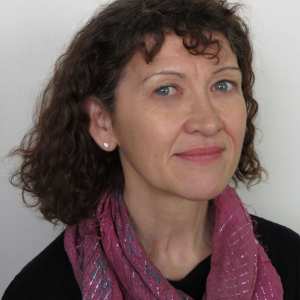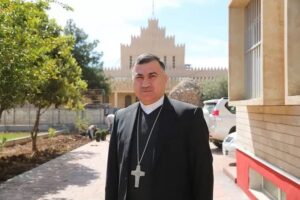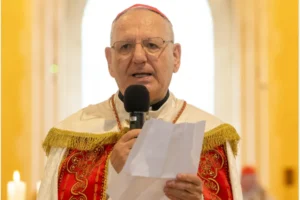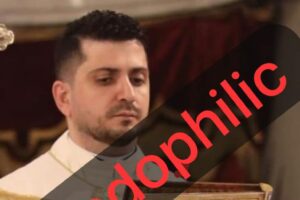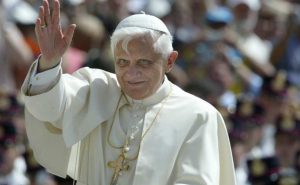
VATICAN CITY, May 17, 2017 (LifeSiteNews) — Pope Emeritus Benedict XVI has strongly endorsed the Vatican’s liturgy head Cardinal Robert Sarah in an afterword for an upcoming edition of Sarah’s highly acclaimed recent book The Power of Silence.
Benedict XVI’s endorsement of Cardinal Sarah’s work is poignant given the apparent chilly reception from Pope Francis’ Vatican to Sarah’s calls for rejuvenating ancient liturgical traditions.
“With Cardinal Sarah, a master of silence and of interior prayer, the liturgy is in good hands,” writes Benedict in a brief afterword, to appear in future editions. It was published today on First Things.
“We should be grateful to Pope Francis for appointing such a spiritual teacher as head of the congregation that is responsible for the celebration of the liturgy in the Church.”
Pope Benedict’s praise comes less than a year after Cardinal Sarah asked bishops and priests worldwide to celebrate the Mass “ad orientem” — literally “toward the east” — in which the priest faces the tabernacle rather than the people.
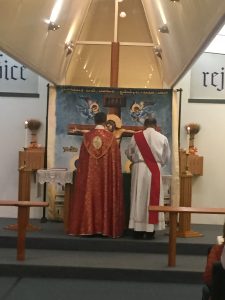
Sarah made his appeal during a July 2016 conference on liturgy in London, England, and suggested priests aim to implement the ad orientem practice by Advent 2016.
He also asked Catholics to kneel to receive Holy Communion wherever possible, and encouraged a generous reception of the traditional Latin Mass.
Sarah said at the time that Pope Francis “has the greatest respect for the liturgical vision and measures of Pope Benedict.”
But two days after Sarah’s comments were published, then-Vatican spokesman Fr. Federico Lombardi issued a public clarification.
The Vatican release stated that some of Sarah’s “expressions” had been “incorrectly interpreted,” and insisted that “new liturgical directives are not expected from next Advent, as some have incorrectly inferred from some of Cardinal Sarah’s words.”
Moreover, Pope Francis “expressly mentioned” in a visit to the office of the Divine Worship that the Traditional Latin Mass “permitted by Pope Benedict XVI” under his Motu Proprio Summorum Pontificum “must not take the place of the ‘ordinary’ one,” the Vatican release stated.
The U.S. bishops followed suit a day later with a press release which referred to the Vatican’s document, and asserted there was no “new mandate for the celebrant to face away from the assembly.”
In October 2016, Sarah was replaced by Pope Francis at the last minute to open the academic year at the John Paul II Institute for Studies on Marriage and the Family in Rome.
In November, Pope Francis overhauled the Congregation for Divine Worship and the Discipline of the Sacraments, removing traditionalists and appointing 27 new members, while retaining Sarah as prefect.
The new appointees included such known progressives as German Cardinal Rainer M. Woelki, who used a refugee boat as an altar for a Corpus Christi celebration, and New Zealand Cardinal John Dew, who during the synod on the family criticized the Catechism’s language describing homosexual acts as “intrinsically disordered.”
Among those dropped from the congregation were U.S. Cardinal Raymond Burke and Australian Cardinal George Pell.
Both men are known for their orthodoxy, and Burke is one of the four signers of the dubia asking Francis to clarify whether Amoris Laetitia departs from Catholic moral teaching.
In December, Pope Francis established a commission to examine Liturgiam Authenticam, the 2001 Vatican document setting guidelines for translating liturgical texts from Latin into the vernacular.
Liturgiam Authenticam called for liturgical texts to be revised when necessary so that they conformed to sound doctrine.
According to the Jesuit magazine America, Francis “significantly” appointed the congregation’s second-in-command, English Archbishop Arthur Roche, as head of the commission.
Roche, who was chairman of the International Commission for English Language in the Liturgy (ICEL) for a decade, “has more experience in the liturgical field and a more open approach to liturgical questions than its prefect, Cardinal Robert Sarah,” America wrote.
Francis set up the commission because he wants to give bishops’ conferences more authority over liturgy, according to America.
It’s also his response to some bishops’ conferences that “do not accept there is such a thing as ‘sacral language’” and oppose Liturgiam Authenticam as “too rigid.”
But famed Vatican watcher Sandro Magister sees the commission’s role as the “demolition” of Liturgiam Authenticam, which he describes as “ one of the walls of resistance against the excesses of the post-conciliar liturgists.”
Pope Benedict writes in his afterword that Cardinal Sarah “teaches us silence—being silent with Jesus, true inner stillness, and in just this way he helps us to grasp the word of the Lord anew.”
In what he suggests “can become an examination of conscience for every bishop,” Benedict quotes Sarah:
It can happen that a good, pious priest, once he is raised to the episcopal dignity, quickly falls into mediocrity and a concern for worldly success. Overwhelmed by the weight of the duties that are incumbent on him, worried about his power, his authority, and the material needs of his office, he gradually runs out of steam.
Benedict adds: “Cardinal Sarah is a spiritual teacher, who speaks out of the depths of silence with the Lord, out of his interior union with him, and thus really has something to say to each one of us.”
https://www.lifesitenews.com/news/pope-benedict-praises-cardinal-sarah-the-liturgy-is-in-good-hands


